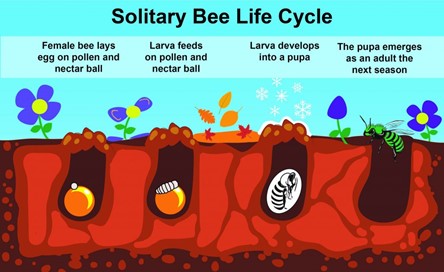I Didn’t Know That!
- 2022-01-07
- By mkirk
- Posted in Horticulture, The Garden Buzz
By Judy Kunz, Colorado Master Gardener
SOS! Support Our Solitary Pollinators
Before reaching for that roll of woven petroleum product, commonly known as landscape fabric or weed barrier, think of our ground-dwelling pollinator friends. The ubiquitous use of this material in recent years is making it increasingly difficult for some of our essential insects to find suitable nesting areas because they are unable to penetrate the barrier.

Over 900 species of bees live in Colorado and seventy percent of them are solitary bees that nest, reproduce and care for their young in cracks and crevices of buildings and fences and in the soil. Approximately one-third of the human diet is pollinated by bees. In effect, bees are essential for life as we know it.
A three-to-four-inch-thick layer of bark mulch or other mulch material without underlying weed barrier can be effective at weed control. Natural mulches look attractive and minimize moisture loss while keeping weeds at bay. Most of them decompose over time and do not interrupt the life cycle of pollinators.
Horticulture Resources
- Garden Buzz Archives
- CSU Extension Resources
- Colorado Master Gardener Program
- Foothills to Plains Native Plant Master Program
- Native Bee Watch Community Science Program
- The Co-Hort Blog
- PlantTalk Colorado
- Soil Testing
- Plant Select
- Emerald Ash Borer
- Japanese Beetle
- Colorado State Forest Service
- Ask an Expert


